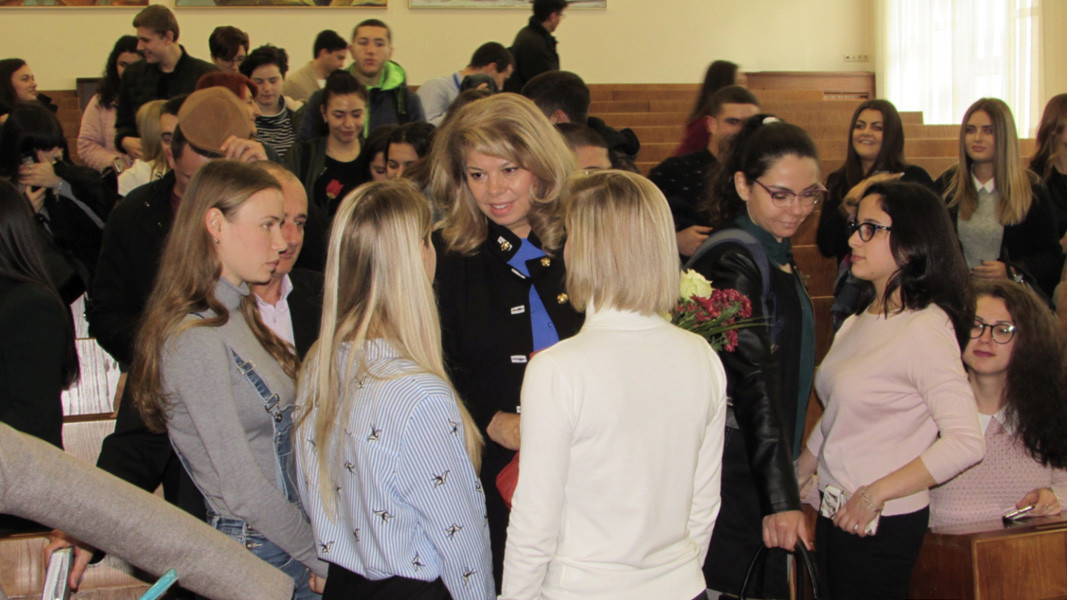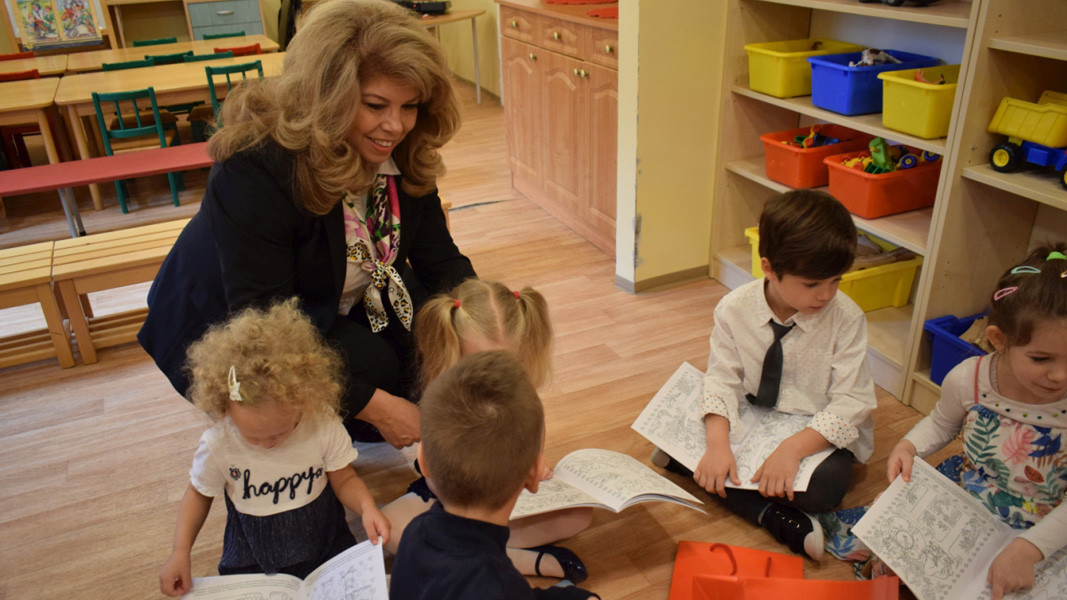“Thank you for this opportunity to talk to Radio Bulgaria because you broadcast for our compatriots abroad – to me, to our institution that is a very important priority,” said Vice-President Iliana Yotova on the eve of the day of Bulgarian education and culture, 24 May. The powers of the institution Mrs. Yotova is at the helm of include working with Bulgarian communities abroad and granting citizenship, but also granting asylum and exercising the right to pardon. Before taking office as Vice-President, Iliana Yotova served three terms as MEP. Europe continues to be on the agenda at her current post, and she organizes student laboratories Europe where she discusses, with young people in Bulgaria, the future of the European project and their expectations connected with it.
“We are obviously at a crossroads, and that is no cliché. This time there is so much as stake – whether the European project will continue to develop, or whether we shall just go with the flow. To my mind, at this time inertia is more dangerous than undertaking reforms in one direction or another. We all expect the future MEPs to be people with a vision. Not just to know what the national problems are but to endeavour to reach out above and beyond them and say how European institutions, European policies should develop so as to win back the trust of the European citizens. What should the principal priorities be? First and foremost fighting poverty. We do not have a political answer ten years after the crisis of 2008. Yes, to begin with saving the big companies that provide jobs made sense – through austerity measures which were to gain such unfortunate notoriety. But that was only supposed to happen during the first years. Now the focus should be on the life of every European citizen.”
One of Bulgaria’s national problems is demography. The state is looking for a solution, in part by attracting Bulgarians living abroad to come and study or work in Bulgaria. The Bulgarian Vice-President recently launched a series of so-called student laboratories connected with the prospects of development with a Bulgarian diploma.

“We met with the five leading universities in the country working with the two Ministry of Education decrees under which, by being offered scholarships, children of Bulgarian origin are encouraged to come and study at Bulgarian higher educational establishments. These are not children from particularly wealthy regions, but they overcome many problems to be able to come and study in Bulgaria. I would like to see the governing bodies of universities in Bulgaria show more ambition and advertise their schools abroad. Because there is stiff competition from Romanian universities, especially coming from universities in the Bessarabian part of Moldova and Ukraine, from universities in Serbia or Russia. So, it turns out that we are giving an opportunity but then are unable to fill the quotas, and that does not look good for a nation like ours. Because these historical diaspora have survived for more than 250 years, whereas we, in our day, as a state, are unable to motivate these young people so they will come and study in this country.”
As soon as she started her term as Vice-President, at meetings with Bulgarian communities around the world Iliana Yotova put forth the idea of setting up a Bulgarian Cultural Institute with the main objective of disseminating knowledge of the Bulgarian language, popularizing the historical achievements and cultural values of Bulgaria.
“Our ambition is bigger than that – not just an institute of the Bulgarian language, but a cultural institute like the institutes Cervantes, Goethe, the British Council, the French Institute. A cultural institute which will assist the association of Bulgarian schools abroad, organize lectures in the Bulgarian language, present present-day and old Bulgarian culture. This means mentioning Bulgaria’s name as a country with some of the oldest traditions in Europe, but also for its enormous cultural and historical heritage. And that is a question of powerful influence. I am fond of saying that where ordinary diplomacy cannot find a way culture is what can help Bulgaria succeed.”
The question of Bulgarian citizenship is very important to Radio Bulgaria’s users, especially in the Balkan countries – Albania, Serbia, North Macedonia.
“There is a working group at the moment with Deputy Prime Minister Mariyana Nikolova which is to draft a concrete position, by the end of July, on how the Bulgarian Citizenship Act can be simplified. My own view is that the certificates of proof of Bulgarian origin should be done away with as a document. At the moment the law is too liberal, it grants the associations of Bulgarians abroad in the historical diaspora the right to issue such certificates. These are associations registered in other countries, i.e. Bulgaria can exercise no control over them. I think that the correct approach when applying for Bulgarian citizenship for reasons of Bulgarian origin is for the first and most important criterion to be knowledge of the Bulgarian language.”

On the eve of the day of the Slavonic alphabet, Bulgarian education and culture, the Vice-President of Bulgaria said she was seeing a “national protectionism in many countries of Europe, which, somehow obligingly, seem to bypass the role of Bulgaria in preserving the legacy and script of Cyril and Methodius.”
“That is why we should fight, constantly, to highlight our merits. There is no peak higher in European history than the golden age of Simeon and that is a universally acknowledged fact. It is acknowledged by scholars in books, though we seem to be unable to relate it to the other European citizens, or to the world. Bulgaria’s Presidency of the Council of the EU, which was a success in many ways, had one big flaw – we did not make use of these six months sufficiently to demonstrate who we are, where we come from and how much we have done for Europe. So it is up to each and every Bulgarian to tell this story. To say what Bulgaria is like today, but also what Bulgaria was like once, and that the future should be sought in the past.”
Elena Karkalanova
Photos: private libraryBulgaria is increasingly becoming part of the general trend and dynamics of European citizens changing their location. There are no inhospitable European countries, rather it is a matter of policies and different interests of the..
The 10 main risks are facing the country in the coming decade, shows a national expert study entitled "Ten years, ten risks for Bulgaria" , BTA reports. "Deterioration of the education system" is the top risk cited by the poll. "Further..
You tell me what you have on your table so I can tell you what you are celebrating. This is a joking way of looking at the Bulgarian calendar of holidays from ancient times to the present day. The truth is that holiday meals have always been a very..
The 10 main risks are facing the country in the coming decade, shows a national expert study entitled "Ten years, ten risks for Bulgaria" , BTA reports...
Bulgaria is increasingly becoming part of the general trend and dynamics of European citizens changing their location. There are no..

+359 2 9336 661
